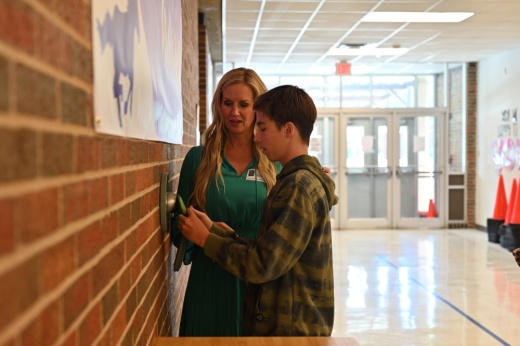The pilot program, which was tested at Forest Meadow Junior High School during the 2022-23 school year, uses Yondr, a company that creates “phone-free spaces” with locked pouches for cellphones. During the 2023-24 school year, the program will expand to include Lake Highlands High, Lake Highlands Junior High, Apollo Junior High and Liberty Junior High schools.
How it happened
RISD Superintendent Tabitha Branum said the impetus for the initiative came from repeated feedback from parents, teachers and students about how much time students spend looking at a screen.
“I knew on the heels of the pandemic that we had to be very bold and very clear about our expectations for the learning environment and really support our teachers in creating a learning environment that is focused on growing our students socially, emotionally and academically,” Branum said.
The first step in creating such an environment was strengthening the district’s already existing cellphone-free policy, which Branum said had become “very loose” over time. The locked cellphone program was meant to be a “tool” to enforce the cellphone-free environment.
The four schools joining the program in the upcoming school year were selected based on their principals’ requests, Branum said. All principals were briefed on the results of the pilot program and could decide whether it would fit the needs of their campuses and whether they had the resources to successfully implement it.
How it works
Students at RISD’s participating campuses are required to put their cellphones in Yondr pouches throughout the school day to prevent usage during class time. Once locked, Yondr pouches remain with the students at all times, according to the company’s website.
To use their phone during the day, students would have to get permission from a teacher or administrator, who could unlock the pouch for them.
If a student needed to access their cellphone during an emergency, their Yondr pouch could be opened “quickly,” RISD Assistant Superintendent Sandra Hayes said. However, each pouch must be manually opened by an administrator or teacher using a specific unlocking device.
Diving in deeper
For the 2022-23 school year, district officials planned to roll out the program at all RISD campuses. When parents seemed hesitant about the program, officials selected Forest Meadow Junior High School to pilot the program during the school year before deciding whether to roll out a wider expansion.
“I really feel like we did this implementation right,” Branum said, noting the district solicited parent, teacher and student feedback throughout the first year of the program.
The results were “overwhelmingly positive,” she said, adding during the school day, students were able to focus on learning more easily without the distraction of their phones. At lunch, they interacted face to face and played games instead of using Snapchat or TikTok, she said.
“The lunch room was louder because [students] were actually talking to each other,” Branum said.
RISD Assistant Superintendent Matthew Gibbins said district survey data shows students are less happy with the program than parents or teachers. Although they don’t want their phones to be locked up all day, he said the students at Forest Meadow have learned the importance of the program throughout the school year.
“They may not like it, but they understand why it’s happening,” Gibbins said.
By the numbers
For teachers, the program gave back 10-15 minutes of class time per day, Branum said. Instead of having to battle against cellphones, teachers could focus on instruction.
All participating teachers at Forest Meadow agreed the program was “necessary,” according to a May RISD survey. Of the students at Forest Meadow, about 14% supported the implementation of the Yondr program, compared to about 68% of Forest Meadow parents.
Also of note
Despite the positive impact on learning, the Yondr program has raised concerns among parents about safety if they aren’t able to reach their children during emergency situations.
Addressing those concerns, Hayes said students are always discouraged from using their cellphones—regardless of the Yondr program—during an emergency because that can distract them from following emergency protocols.
Although she didn’t want to provide specific details, Branum said there is a way to quickly give students access to their phones as needed, such as in an emergency. She added students all have access to email through their district-provided laptops during the school day. Parents who need to reach their kids for an emergency, changed pickup time or any other information can send them an email, she said. Additionally, they can call the district’s front office team.
Going forward
Branum’s long-term goal with the program is RISD can eventually outgrow it, she said. She hopes that in three years, the district’s implementation of a strict cellphone-free environment becomes part of each school’s culture, she said.
For example, students at Forest Meadow will already be accustomed to using Yondr pouches when they graduate and move up to Lake Highlands High School. Branum said they “won’t know anything different,” and she hopes it becomes an “expectation” that they don’t use their cellphones during the school day.
She said she has no plans to implement the Yondr program at every RISD school.
“Our job is to support the needs of the campus, but it doesn’t always mean that that support looks the exact same,” Branum said. “We will differentiate the support and resources based upon the individual needs of the campus.”





